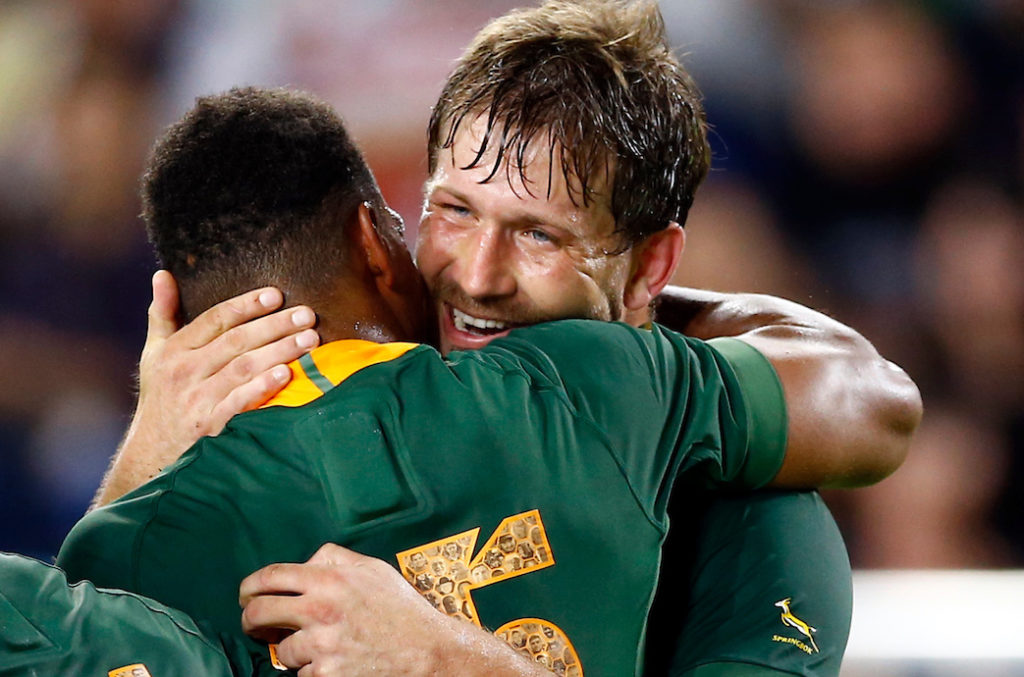Will Rassie Erasmus risk a controversial end to South Africa’s 2019 Rugby World Cup campaign to give the Boks their best shot at bringing the trophy home from Japan, rugby analyst ZELIM NEL asks.
It’s mission accomplished for the Bok coach after clinching a place in the semi-finals with a 26-3 win against the host nation.
A quarter-final exit would rightly have been deemed a failure for SA but a place in the final four ticks all the boxes and anything positive that happens from now on will be considered a bonus.
Don’t forget that this time two years ago, fans were mourning the biggest loss in Bok history – a 57-0 implosion against the All Blacks in Albany.
In 2018, Erasmus inherited a team that had won just 11 of their previous 25 Tests under Allister Coetzee. Since then, Bok dignity has been salvaged with a 15-1-8 record that includes victories over England, the Wallabies and All Blacks, and a draw in New Zealand en route to locking up the 2019 Rugby Championship trophy.
The safe play is not to change anything, perhaps edge Wales in the semi-final, congratulate whoever wins the final and then head on home to stakeholders satisfied with SA’s revived contender status.
In my experience, Erasmus is an all-out, no-holds-barred competitor. Unlike many of his colleagues, he measures success on the available space in the trophy cabinet.
Erasmus famously converted the Stormers, perennial loafers, into Super Rugby heavyweights and then stunned the Cape rugby fraternity in 2012 by resigning when the team’s continued progress was jeopardised by (among other things) news that Jaque Fourie, a huge part of the defensive package, had signed a big deal in Japan. The Stormers haven’t won a playoff match since.
He’s not afraid to make big calls and it’s time for another one if the Boks are serious about being crowned world champions in a fortnight.
Based on current form, it’s difficult to see how South Africa will win the 2019 Rugby World Cup with the misfiring tactical triumvirate of Faf de Klerk, Handre Pollard and Willie le Roux at the controls.
De Klerk’s kicking game is a lottery, Pollard is a lurching distributor and Le Roux has yet to produce any evidence of the game-changing flair that warranted the selection of a playmaking fullback with limited range in the kicking game.
This is no knee-jerk reaction to an untidy quarter-final performance. Blocking Japan’s hand speed was always going to require grappling rather than flying round-house kicks. However, it’s deeply concerning that, despite the pack asserting their supremacy, the Boks repeatedly squandered opportunities to flip the field or convert breaks into tries.
ALSO READ: Ambitious Boks must be ruthless
The heavies will have less jurisdiction against Wales and the resultant opportunities will therefore be in much shorter supply. The opportunities curve will dip even further against whichever of England or New Zealand advances to the final.
De Klerk, Pollard and Le Roux made little impression on the All Blacks in South Africa’s world cup opener, a 23-13 reverse. The Boks scored three points in the first half and Pollard’s drop goal at the end of the third quarter saved them from failing to score in the final half hour of that match.
Dropping the incumbents would offer no guarantee of World Cup success, but it’s my opinion that making changes would give Wales, and hopefully England or New Zealand, much more to think about.
Rookie Herschel Jantjies is nothing if not clutch (see: last-minute try against All Blacks in Wellington). His kicking game may not be in the same class as Ben Youngs or Aaron Smith, but he’s currently more consistent than De Klerk.
Damian Willemse embodies the best of Pollard and Elton Jantjies plus more – a natural footballer with a serviceable kicking game, he’s abrasive in contact, elusive in small spaces and has the kind of speed to hurt teams on the break.
The lack of experience in this halfback combination is what would make the change a high-stakes gamble. Neither have enough time in the saddle to be considered mature tacticians who can be relied upon to stick to the script.
But there’s an experienced option to replace Le Roux at the back in 64-Test veteran Frans Steyn. Even though these days he’s looking more like Tom Cruise in Tropic Thunder than Days of Thunder, Steyn’s big chassis, experience and legendary kicking game would improve SA’s ability to control field position and dent the scoreboard.
Alternatively, Cheslin Kolbe could be shifted to fullback where his current form, quickness and escapability would present a threat that influences opponents’ kicking plans.
While there are obvious vulnerabilities inherent in fielding a 74kg fullback, Kolbe does deserve more credit for his ability to contribute to the kicking game.
Again, the safe and obvious move for Erasmus is to retain the status quo, hope for a friendly referee and a bit of luck, and then head home to applause for a good effort that came one or two wins short of first prize.
Dropping the Bok halfbacks and fullback now, in the buildup to a World Cup semi-final, would be seen as utter madness – like walking away from the Stormers after building the team from scratch and taking them to their only Super Rugby final.
Stat Attack: Japan’s style no match for Boks’ power
Photo: Agnes Browne – Steve Haag Sports





